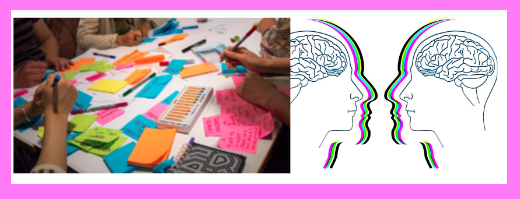


Research on Cooperative Learning:
- Homogeneous ability grouping can lead to widening of ability gaps in students
- 5 Elements of Cooperative Learning:
- Positive interdependence
- all members’ efforts needed to succeed
- Face-to-face promotive interaction
- encouraging feedback
- Individual and group accountability
- Interpersonal and small group skills
- communication, trust, leadership, decision making and conflict resolution skills
- For ideas on how to scaffold these skills, see Collaboration articles
- Group processing
- reflection on how group collaborates in order to improve collaboration
- Positive interdependence
- Cooperative learning has outperformed competitive learning and individual learning in several research studies
- 3 Generalizations from research:
- Organizing groups based on ability should be done sparingly
- homogeneous ability grouping does not help low performing students
- Cooperative learning groups should be kept small in size
- suggest 3 to 4 members per team
- Cooperative learning should be applied consistently and systematically, but not overused.
- signs of overuse
- task is not designed to required team work
- not enough time built in for independent practice
- cooperative learning improves when applied at least once per week
- signs of overuse
- Organizing groups based on ability should be done sparingly
Classroom Practices:
- Use a variety of grouping methods
- random – by color they’re wearing, picking out of hat, by birthday
- by common interests – can build on common experiences
- Use informal, formal and base groups
- informal:
- examples: pair-share, turn to your neighbor that last few minutes per class periods
- uses: clarify expectations, co-process information, co-reflect/closure on activities
- formal:
- examples: project teams
- tips: design tasks that include 5 elements of cooperative learning
- base groups
- support groups that are long term (could be semester long)
- sample use: meet 5 minutes each day to discuss upcoming deadlines and homework
- informal:
- Managing group size
- task should match size of team
- larger teams require more collaborative social skills
- Combining Cooperative Learning with other classroom structures:
- allow time for individual processing and independent practice

Cooperative learning is a regular feature of project-based learning (PBL). The five elements of cooperative learning can be used to design and refine tasks that help students learn and work better in teams. Using different types of groups (informal, base, and formal) can help students get peer support from multiple class mates. Being mindful of possible overuses of cooperative learning can help PBL facilitator create opportunities for individual learning to balance out cooperative learning experiences.

Preparation Steps
- Design lessons that leverage informal grouping to extend academic talk
- Research strategies that relate to 5 elements of cooperative learning and incorporate these into design for content and collaboration scaffolding
- Design group activities that incorporate 5 elements of cooperative learning. See above
Early Implementation Steps
- Implement group activities that incorporate 5 elements of cooperative learning.
- Use informal grouping to extend academic talk during scaffolding activities
- Have teams reflect on which of the 5 elements of cooperative learning are at play in activities, how they are working and how to improve them
Advanced Implementation Steps
- Create notebook resources that provide strategies that connect to 5 cooperative learning strategies
- Have students use collaborative strategies resource to help design and implement group contracts and to help facilitate team meetings
- Explicitly teach students social skills needed to collaborate effectively. See Collaboration articles for ideas.
- Use base value groups to provide steady support for students – can use to provide encouraging feedback, reminders of deadlines, practice individual goal setting skills, etc

- Collaboration articles
